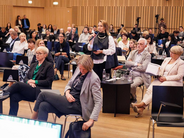On 30 September 2024, the President of the Republic of Slovenia Nataša Pirc Musar at Brdo pri Kranju hosted the fourth President’s Forum, in the forefront of which was the right to healthy living environment. In the light of endangering the entitlement to this right, the participants addressed the challenges of climate change and preserving biotic diversity and tried to find answers how to strengthen the response to them.
The Forum was opened by the President Dr Nataša Pirc Musar, while the participants were addressed also by the Minister of Natural Resources and Spatial Planning Jože Novak, the Minister of Agriculture Mateja Čalušić, and the State Secretary at the Ministry of the Environment, Climate and Energy Uroš Vajgl. At three panels, their views were presented by researchers from different scientific disciplines, representatives of various institutions, and other experts, while their common recommendations will be handed over to the decision-makers.
During the debate, Deputy Ombudsman Dr Dijana Možina Zupanc emphasised that violations of human rights in this field are ongoing, since every year the institution receives almost 200 complaints, of which approximately one fifth is valid. Considering the influence of climate change and other negative consequences of the manner of treating the environment, many more are to be expected in the future. Globally, lawsuits against countries due to violations of rights to healthy environment are increasing.
Based on the treated complaints, the Ombudsman estimated that in Slovenia long-lasting problems in the field of the environment are not being solved adequately. He has also been warning all along that when adopting measures and infringing on the existing human rights, the test of proportionality always needs to be made and evaluate whether the presented option of action is the only one and what damage it can cause. Decision-making bodies must implement the interventions in the environment with a shaky hand and found them very well in order to make them coherent with the demands of the rule of law. Namely, their effect is irreversible and their consequences long-term and instead of being beneficial, they can become a burden for future generations, was emphasised by the Deputy Ombudsman. “Let us not forget that climate change is the reason for numerous economic and war migrations, it causes people’s hardship, and writes tragic stories. The care for the environment is also the care for social stability and for the safety of every single person on this planet, thus short-term profitable goals must not prevail,” she added.
In her words, the Human Rights Ombudsman brings attention of those responsible to the fact that a careful consideration needs to be made when forming environmental policies, with the profound inclusion of other sectors, while simultaneously supervision mechanisms must be strengthened. In addition to respecting international commitments, national regulations are also important. “Acts of the utmost quality are, as a rule, clearer and that makes their implementation easier and faster, while simultaneous inclusion of the public, especially expert public and wide consultation with it, decreases potential oppositions,” concluded the Deputy Ombudsman.
Source: The Office of the Human Rights Ombudsman of the Republic of Slovenia

